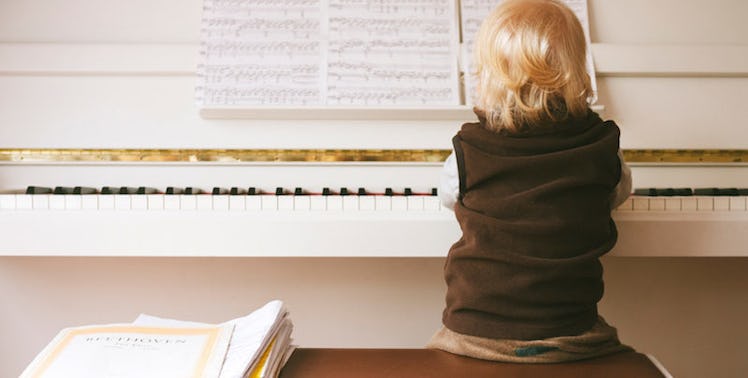
Why I'll Teach My Son To Embrace The Arts Without Hesitation
I have extremely vivid memories of my childhood. Sometimes, I can see them so clearly, I wonder if I might actually have a photographic memory. (If I do, where the hell was it during European History 101?)
One of my most consistent memories is staring at paintings in my parents' and grandparents' houses, and imagining the worlds they were set in.
What were the people doing? Why were they doing it? What did the air feel like there?
For as long as I can remember, I have known that art, in all its varying forms, is made to tell stories (whether I understand those stories is a whole other beast).
As I got a bit older and began to appreciate a wider span of creative avenues, I discovered art is used to make statements, express opinions and draw attention to the things nobody wants to talk about.
The brilliant part is, since it rarely employs language in the form we are most accustomed to, when art brings an issue to the table, people are more comfortable engaging in uncomfortable (but necessary) conversations.
And that's what I think my son needs to know.
The arts get a bad rep.
I know this because the arts were the first place I ever remember feeling like I belonged. So since I was very young, I have been privy to all the opinions people commonly have about music, literature and the visual arts.
"It's what you do if you want to become a teacher" is one of the more popular ones. I've also heard the words "useless degree" being tossed around.
I may have actually said them myself a few times -- especially in the years after I graduated from U of T only to work in retail.
But, I want to make sure my son sees art for what it is. I want to look at paintings and listen to music with him.
I want to ask him what he thinks the painter was feeling while he worked, or how he thinks the composer wants him to feel when he listens to her song.
I want him to know that writers are recording the reality of the time in which we live. In the future, people will form their opinions about the past by referencing their words.
I don't want him to see artists as pipe dreamers or naive idealists, when in fact, they deliver such important messages through their works.
The world (and his maternal grandfather) will teach him the importance of business, science and technology.
We can't escape these messages, so when my son grows up, and begins to make decisions about the life he wants for himself, I can promise you he will know all about how honorable and respected those professions are.
His father will teach him about sports. Not just how to play, but also about loyalty, teamwork, commitment, pride and grace.
He'll learn his body is a tool that his brain has power over, and he can accomplish incredible things if he decides he wants to.
I feel that, as his mother, I have a responsibility to him; to teach him that art is just as important, and if he feels the urge to create, he should never repress it.
If he never feels that pull, that's completely fine; I understand it's not something to which everybody can relate.
But, if he does, I would hate for him to feel embarrassed about it, or mentally set it aside because he's been made to think it will distract him from success.
I need my son to know how art imitates life.
He needs to understand that the artists are the ones asking questions, addressing the hard topics.
My hope is that, whether or not he wants to join the conversation, he will realize it will always serve him well to actively listen to what their art is telling him.
If it needs to, art will find its way in.
And if you explore it, it can bring you something that feels different from traditional success, but just as good -- if not better.